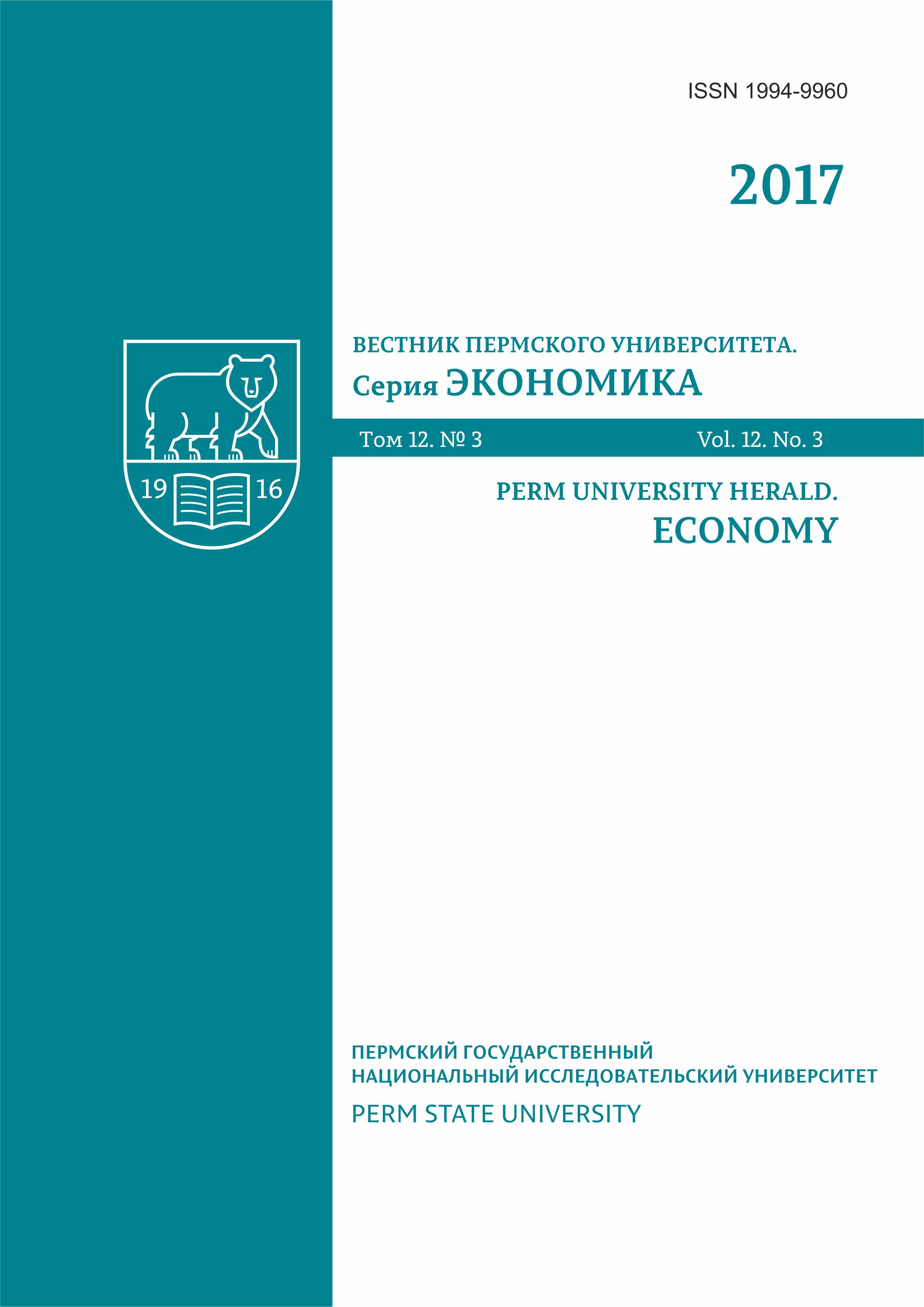Теоретическое обоснование необходимости модификации государственного регулирования открытых хозяйственных систем в условиях глобализации
DOI:
https://doi.org/10.17072/1994-9960-2017-3-388-403Аннотация
Проведен анализ влияния глобализации на теорию и практику государственного регулирования хозяйственных систем. Исторический опыт развития экономической теории свидетельствует о том, что существующие теоретические подходы к исследованию вопросов государственного регулирования возникли вследствие необходимости разрешения проблем, свойственных определенному этапу развития экономики. В связи с этим практика государственного регулирования должна опираться на всю систему знаний по данному вопросу и учитывать особенности, присущие конкретной хозяйственной системе на определенном этапе ее развития. Цель авторского исследования – выявление тенденций в сфере бюджетно-налогового и денежно-кредитного регулирования открытых хозяйственных систем посредством анализа мировой теории и практики государственного регулирования. В основе данного исследования лежат методы научной абстракции, исторического и логического подходов. В ходе исследования теории государственного регулирования выделен ряд актуальных проблем, среди которых на первом месте дискуссии между ведущими экономистами относительно масштабов, механизмов и целей влияния макроэкономической теории на практику государственного регулирования. Следующим полем для дискуссий стал выбор между приоритетами и механизмами бюджетно-налоговых и денежно-кредитных инструментов государственного регулирования. Данные противоречия усиливаются глобализационными процессами в денежно-кредитной системе и ограничениями в бюджетно-налоговой сфере. В свою очередь, приоритетность тех или иных инструментов экономической политики определяется выбором режима валютного курса. Установлено, что проблема выбора между автоматической и дискреционной политикой государственного регулирования глубже, нежели просто оптимизация сочетания инструментов государственного регулирования, поскольку затрагивает основы взаимодействия государства и рынка и границы вмешательства государства в экономику. Сделан вывод, что современные достижения в области макроэкономической теории в большей степени затрагивают денежно-кредитную сферу, не учитывая пропорции и динамику развития реального сектора, которые, по мнению автора, должны определять направления и содержание государственного регулирования хозяйственной системы любого типа. Предложена классификация тенденций в сфере бюджетно-налогового и денежно-кредитного регулирования, описывающая процесс трансформации каналов денежно-кредитной трансмиссии и образование ограничений в области бюджетно-налоговой и таможенной государственной политики. Перечисленные тенденции свидетельствуют о трансформации тандема «рынок – государство» не только на национальном, но и наднациональном уровне.
Ключевые словагосударственное регулирование, фискальная политика, монетарная политика, дискреционная политика, автоматическая политика, режимы валютного курса, открытые хозяйственные системы, глобализация
Для цитированияКамышова А.Б. Теоретическое обоснование необходимости модификации государственного регулирования открытых хозяйственных систем в условиях глобализации // Вестник Пермского университета. Сер. «Экономика». 2017. Том 12. № 3. С. 388–403. DOI 10.17072/1994-9960-2017-3-388-403
Список литературы1. Chari V.V., Kehoe P. Modern Macroeconomics in Practice: How Theory Is Shaping Policy // Journal of Economic Perspectives. 2006. Vol. 20. № 4. P. 3–28.
2. Mankiw N.G. The Macroeconomist as Scientist and Engineer // Journal of Economic Perspectives. 2006. Vol. 20. № 4. P. 29–46. doi: 10.1257/jep.20.4.29.
3. Камышова А.Б. Государственное регулирование трансформации экспортно-сырьевой экономики: дисс. … д-ра экон. наук: 08.00.01. СПб., 2013. 374 с.
4. Obstfeld M., Rogoff К. Risk and Exchange Rates // NBER Working Paper. August 1998. № 6694. URL: http://eml.berkeley.edu/~obstfeld/riskexch.pdf. doi: 10.3386/w6694 (дата обращения: 20.02.2017).
5. Deverux M., Engel C. Monetary Policy in the Open Economy Revisited: Price Setting and Exchange Rate Flexibility // NBER Working Paper. April 2000. № 7665. URL: http://www.ssc.wisc.edu/~cengel/PublishedPapers/MonetaryPolicy.pdf. doi: 10.3386/w7665 (дата обращения: 10.04.2012).
6. Taylor J.В. Discretion Versus Policy Rules in Practice // Carnegie-Rochester Conference Series on Public Policy. December 1993. № 39. P.195–214.
7. Fontana G., Palacio-Vera A. Monetary Policy Rules: What Are We Learning? // Journal of Post Keynesian Economics. 2002. Vol. 24. № 4. P. 547–568.
8. Fischer S. Distinguished Lecture on Economics in Government Exchange Rate Regime: Is the Bipolar View Correct? // The Journal of Economic Perspectives. 2001. Vol. 15. № 2. P. 3–24. doi: 10.1257/jep.15.2.3.
9. Kydland F.E., Prescott E.C. Rules Rather than Discretion: The Inconsistency of Optimal Plans // Journal of Political Economy. June 1977. Vol. 85. № 3. P. 473–492.
10. Kopits G., Symansky S.A. Fiscal Policy Rules // IMF. Occasional Papers. 1998. № 162. P. 1–45.
11. Камышова А.Б., Погорельская Л.Н. Сочетание плановых и рыночных начал в государственном регулировании современной экономики // Вестник Российской академии естественных наук. 2013. № 1. С. 14–17.
12. Rodrik D. Feasible Globalization // NBER Working Paper 9129. Cambridge Mass. August 2002. URL: http://www.nber.org/papers/w9129.pdf. doi: 10.3386/w9129 (дата обращения: 23.04.2017).
13. Осадчая И. Постиндустриальная экономика: меняется ли роль государства? // Мировая экономика и международные отношения. 2009. № 5. С. 31–42.
14. Bean Ch.R. Commentary: Impact of Globalization on Monetary Policy. The New Economic Ge-ography: Effects and Policy Implications: a Symposium sponsored by the Federal Reserve Bank of Kansas City, Jackson Hole, Wyoming. August 24–26, 2006. URL: https://www.kansascityfed.org/publicat/sympos/2006/pdf/20bean.pdf (дата обращения: 15.05.2012).
15. Gudmundsson M. Financial Globalization: Key Trends and Implications for the Transmission Mechanism of Monetary Policy // BIS Papers. April 2008. № 39. P. 17–58.
16. Wagner H., Berger W. Financial Globalization and Monetary Policy // DNB Staff Reports. 2003. № 95. URL: https://www.dnb.nl/en/binaries/con5_wagner_tcm47-152779.pdf (дата обращения: 29.01.2011).
17. Kashyap A.K., Stein J.C. What Do a Million Observations on Banks Say about the Transmission of Monetary Policy? // American Economic Review. 2000. Vol. 90. № 3. P. 407–428. doi: 10.1257/aer.90.3.407.
18. Cetorelli N., Goldberg L.S. Banking Globalization, Monetary Transmission, and the Lending Channel // Federal Reserve Bank of New York Staff Reports. 2008. № 333. P. 229–251.
19. Шишков Ю. Государство в эпоху глобализации // Мировая экономика и международные отношения. 2010. №1. С. 5–10.
20. Загашвили В.С. Государство на новом этапе экономической глобализации // Мировая экономика и международные отношения. 2009. № 5. С. 47–78.
21. Головнин М. Теоретические подходы к проведению денежно-кредитной политики в условиях финансовой глобализации // Вопросы экономики. 2009. № 1. С. 42–58.
22. Головнин М. Финансовая глобализация и ограничения национальной денежно-кредитной политики // Вопросы экономики. 2007. № 7. С. 20–42.
Загрузки
Опубликован
Выпуск
Раздел
Лицензия

Это произведение доступно по лицензии Creative Commons «Attribution» («Атрибуция») 4.0 Всемирная.










